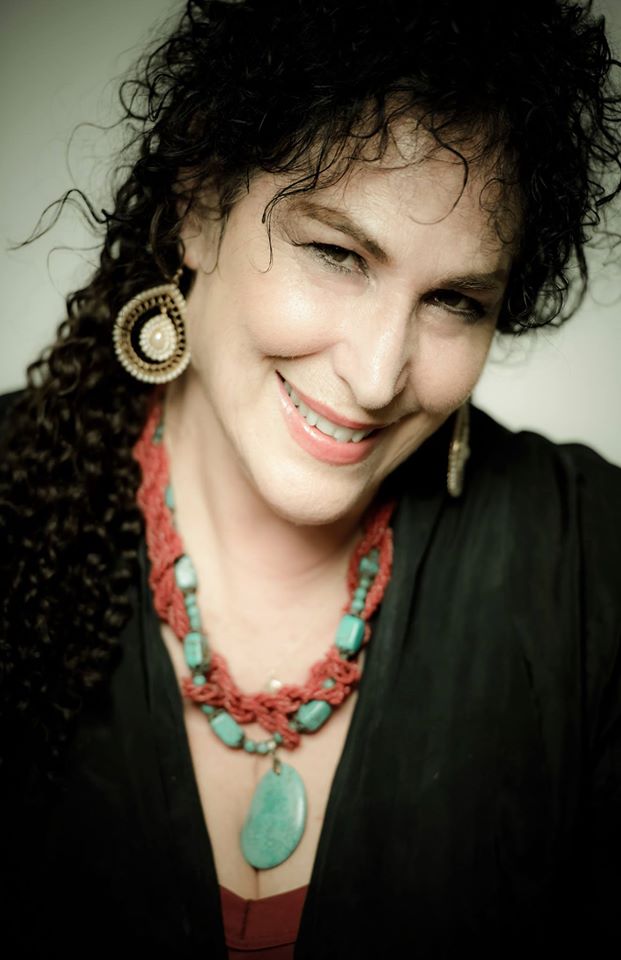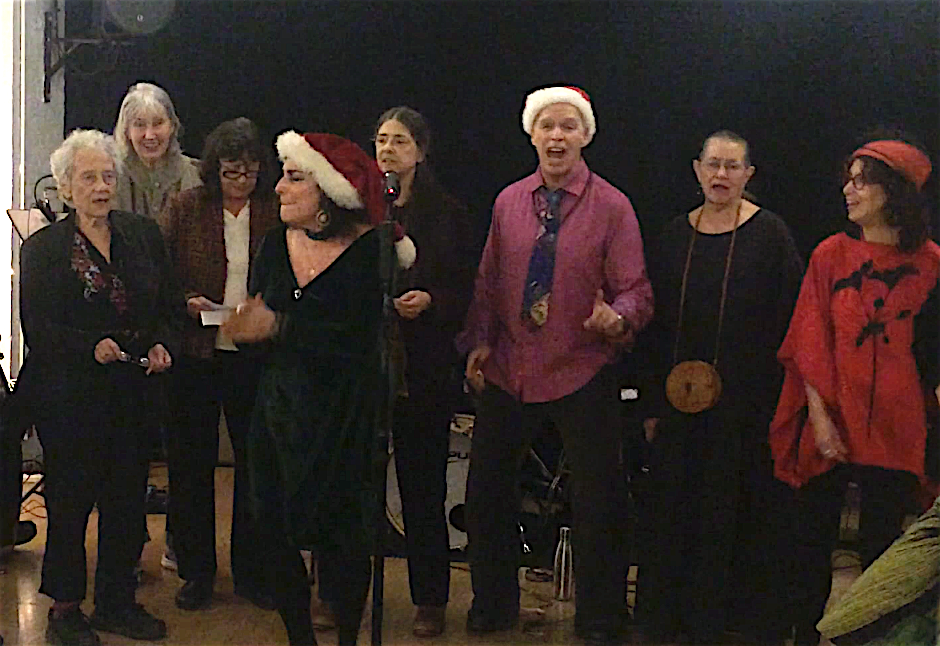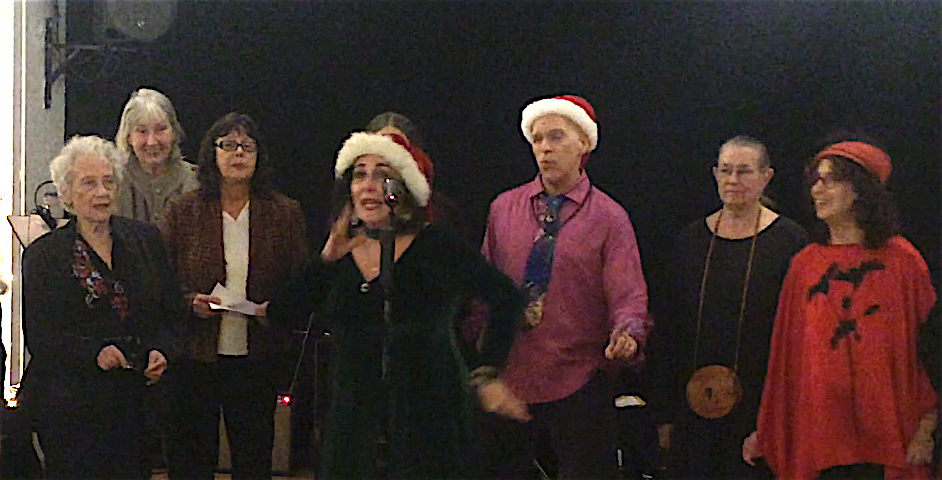BY MICHELE HERMAN | There’s a Buddhist expression I’ve always loved: When you’re ready to learn, the teacher will appear.
All my life I’ve been convinced I can’t carry a tune, and as a result I’ve been terrified of singing in public. This is a liability when you love musicals with as much passion as any theater-camp kid and your husband is a singer and you hang around in cabarets.
Years ago for Christmas my thoughtful husband got me six Alexander Technique lessons aimed at combatting my fear and tone-deafness — but, the way I remember it, the teacher took one look at me and spent all six sessions just trying to help me release the tension in my body. I got the message that I was so far gone that I would never get to the singing.

Then, close to two years ago I learned that Westbeth had been offering a free, open-to-all weekly singing class for a while, paid for in part with funds from City Council Speaker Corey Johnson’s office. The time was perfect for my schedule: 4:30 to 6 Friday afternoons. I got that queasy feeling that I’ve learned is my body’s perverse way of telling me to forge ahead. I screwed up my courage and went over to the community room.
My timing was unfortunate; that was the week mutiny broke out in the group known as the Bliss Singers. There were maybe 15 people in the room. In true Westbeth fashion, each one held a different firmly held opinion about what the class should be. There wasn’t enough instruction. There was too much instruction. The repertoire was too demanding. The repertoire was too narrow. Why was there repertoire at all instead of just a sing-along?
To her great credit, the teacher, an accomplished jazz singer and songwriter and longtime Westbeth resident named Eve Zanni, let everyone vent and promised to address the concerns. The easygoing, extremely nimble accompanist, Isaac Raz, rolled with the punches.

I decided to try again, and things did indeed get better, sometimes even blissful. Eve broke the class time into distinct segments: professional warmup, repertoire work, optional special performances, and a singalong, with the occasional dance break that allows Isaac to go to town on the piano. SuZen, one of the regulars, figured out how to project the lyrics on a screen to eliminate Xeroxing and the constant shuffling of paper.
The group, mostly female, was split into sopranos and altos. I didn’t really know what I was, but Eve put me, as she puts most of the new women, into the sopranos. I learned that singing the high notes helps develop what singers like to call the “instrument,” a term that sounded way too fancy for anything that had ever come out of my mouth. Besides, she always needs more sopranos.
It’s been almost two years now, and I’ve hardly missed a week. I treasure the warmups, which I do think are relaxing the instrument with its well-hidden network of pipes and muscles and nerves. As I’ve always heard and understood intellectually, singing is about the breath and the diaphragm. When Eve has us get up off our folding chairs and Isaac sets the tempo and the key for our warmup, I try to trust that the knowledge is making its way down from my brain into the rest of my body.
We anchor ourselves loosely on our feet. We take deep, full breaths. We trill our lips and we massage our jaws, overworked from talking and chewing and holding the tension of the day. We sing sequences of vowel sounds in patterns up and down the scale. We do a few tongue twisters to limber up our mouths for consonants. We make funny sounds — sirens, drunken babies, owls in the cathedral — which forge an essential link between our speaking voice and our singing voice.

We sing a mix of rock, standards, musical theater, folk and blues, with an emphasis on peace and love. Our standbys include “Scarborough Fair,” “Blue Skies,” “We Shall Overcome,” “Goodnight Irene,” “Sixteen Tons” and “Sermonette,” many with arrangements created by Eve. The jazz great Gil Evans used to live at Westbeth, and his spirit pervades the room, where we’re currently working on his arrangements from “Porgy and Bess.”
Classmates come and go, and they all leave a mark. There’s also a core group of us, and there’s alchemy: We’ve moved in nearly imperceptible increments from strangers to classmates to a community of friends. I believe that in this world the distance between despair and hope is very small: however far you have to travel to find an activity you like and share it with others who like it, too.
I love it when Steve (who I used to describe to my husband as “the really enthusiastic guy” before I got to know and love him) joins Annie (who doesn’t project much but has a great way with the blues) at the front of the room for Eve’s clever additions to “Sunny Side of the Street.” There’s the lovely Israeli guy and his Schnauzer Mordecai, the retired professor whose late husband was the composer Paul Turok, the retired teacher from P.S. 3. There’s Noreen from South Africa, a fellow singing self-doubter to whom I will always be grateful, because she recruited me to sing a few old rock-and-roll songs with her and she gave me the chutzpah to get up in front of the class and sing solo for the first time in my life. The upshot: I sang the shortest and easiest song I know, “Give My Regards to Broadway” and I didn’t die of embarrassment.

The most charming of the bunch has been our three-generation group: Barbara, her choreographer daughter Pele and, on Pele’s lap, her own young daughter. I could go on. The saddest part is that we regulars have been attending long enough to see a couple of the oldest women fade away.
We’re a mix of people with some singing chops and a whole lot of singing chops, people who just love to sing, and inexperienced, insecure singers like me. No one judges. Occasionally a professional singing friend of Eve’s will make a guest appearance and do a jazz number, a great treat.
We’ve done a few Westbeth gigs. Our rendition of “Please Don’t Take Our Bus” with Eve’s words to the tune of “Up on the Roof” may have played a role in saving the M14 line. We performed at the Westbeth holiday party on the evening of Sun., Dec. 8, in the Community Room. And we’ll carol in the lobby on Fri., Dec. 20, from 4:30 p.m. to 6 p.m.
The most important lesson I’m learning is that there’s the speaking voice and the singing voice, but also a third voice. It’s quick and diabolical and waits, dormant, inside my brain, ready to say, in a thousand clever ways: Who do you think you are, trying to sing? The chain reaction is instantaneous and insidious: The whole apparatus from lips down to stomach tightens. I lose faith and it wins: I can’t sing. Just from showing up week after week, I can now catch that voice when it’s about to pounce. I don’t listen to it anymore.
Many of us have the impulse to try too hard. I’ve learned that when there’s a high note ahead, it’s really not necessary to screw up my face and lunge for it, in the process straining my vocal cords. I relax and trust that it will arrive lightly.
I’m still mostly singing with the training wheels on — other voices on either side of me to keep mine from falling flat. But a few times we sopranos have huddled so we can hear each other better. Let’s say we’re doing the gorgeous traditional song “All Things Shall Perish From Under the Sky” in rounds with the altos across the room. We pull our folding chairs close as we begin the high second phrase: “Music alone shall live.” I hear Sue on one side of me and Laurie (an alto who sometimes pinch-hits with us sopranos) on the other, and a miracle occurs, a reproducible one, thanks to Eve and Isaac.
Our separate voices merge. The sound is gorgeous, and I played a small role in creating it.

Wonderfully worded and highly inspiring! Thank you Michelle!